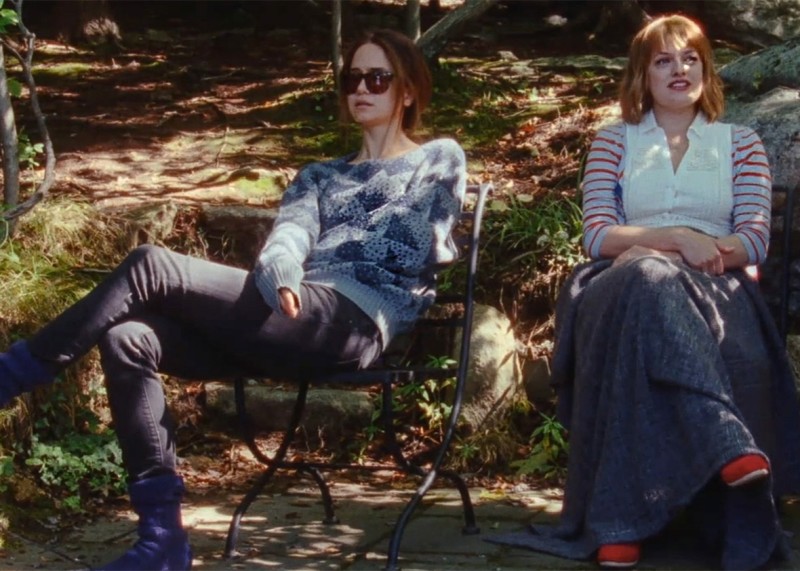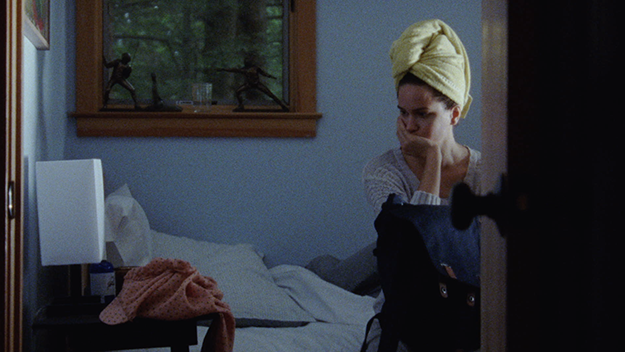Queen of Earth is a mysterious film—and one that comes as something of a shock. If you saw Alex Ross Perry’s last feature, the brittle and somewhat savage literary comedy Listen Up Philip, and come to his follow-up hoping for something similar, then the effect is rather like turning up at a party expecting good cheer and familiar company, only to find that everyone is a stranger to you and acting very oddly, perhaps even menacingly. That, in fact, is something like the predicament of Queen of Earth’s troubled heroine, a guest at a house where she may not be entirely welcome—although things in Perry’s drama get a little bit deeper and more complex than that. How much deeper, how much more complex, is hard to say exactly. Queen of Earth teases our perceptions in such a way that you sometimes wonder whether there’s less to it than meets the eye—even while the film often makes us worry that we’re missing something elusive just below its surface. This uncertainty about the very nature of what we’re watching is the same tantalizing precariousness of meaning that drives a whole strain of modernist cinema, typified at its height by Last Year at Marienbad or Persona in the Sixties. It’s that nowadays neglected (even, for some, discredited) strain that Perry harks back to in this willfully anachronistic piece. The premise is simple. A young woman, Catherine (Elisabeth Moss), visits her old friend Virginia (Katherine Waterston) at the lakeside house belonging to the latter’s family. Catherine hopes to find respite from her traumas—her split from boyfriend James (Kentucker Audley), who’s been seeing another woman, and the death of Catherine’s artist father, whose assistant she had been, putting her own artistic career on hold. The opening sequence, holding tight on Catherine’s face as she confronts James, shows us the extent of the emotional injury: her face is raw, tear-soaked, her nose red, and the sequence is the first instance of the unnerving, highly controlled intensity that Moss brings to her character throughout. The subsequent action is divided, chapter by chapter, into the days of the week that Catherine stays at the house. Flashbacks reveal that she was there the previous year, with James; back then, she was a very different woman, glowing with amorous joy, but in her hostess’s opinion, a little too fond of her boyfriend: “You seem cripplingly co-dependent,” Virginia sourly comments. Back then, Virginia was experiencing some emotional turbulence of her own, which makes the two lakeside episodes, a year apart, something like mirror images. The sense that the two women have exchanged roles, or that in some way, each is the other, is alluded to in shots that show them gazing in the same direction, side by side—echoes not just of Persona, but of a later riff on Bergman, Woody Allen’s Interiors (one of the Seventies influences that Perry has acknowledged, along with Robert Altman’s Images).
The film feels like a two-hander, so taut is the interplay between Moss and Waterston. But other characters show up, some perceived as distinct sources of danger by Catherine, whose apparent paranoia hits full-on Polanski levels at a party, where a crowd surrounds her in a POV crush of hands and faces. The previous year, Rich (Patrick Fugit) turned up—Virginia’s lover and literally the boy next door. A year later, he’s still around, his ostensible affability giving way to malign intent, all smooth smiles as his confrontational manner cracks Catherine’s psyche open a few notches further. Gone Girl apart, I don’t think I’ve seen Fugit in anything since 2000’s false-start showcase Almost Famous made him just that—but he’s very effective here, quietly shark-like, faintly camp and with a nuance of young Harvey Keitel that adds to the menace. Queen of Earth has moments of outright melodrama, a distinct tang of Tennessee Williams. And at moments, Perry seems discreetly to be sending up that very edge of excess—he’s winking at us perhaps a touch too broadly when he has Virginia reading a copy of Women and Madness (later, she’s absorbed in a novel by the apocryphal Ike Zimmerman, the literary maestro in Listen Up Philip). The glaring intensity of certain moments can indeed seem self-parodic—but then so can the acting out that people display when they manifest their inner disturbance by overtly “performing” that disturbance, and that may be just the case with Catherine here. It may be the case with Virginia too, although she’s harder to fathom—it’s often hard to know whether she’s composed and solicitous or downright malevolent. Waterstone’s Virginia is very finely gauged, at times a downright inscrutable read. All in all, Queen of Earth shares this elusiveness: at face value, individual scenes or stretches of dialogue may appear to reveal very little, or simply to offer direct accounts of what a character is feeling. But certain little counterintuitive inflections can make them very different—as when Catherine angrily demolishes Rich at some length, yet maintains a cold, calm smile for most of it, or when Virginia tells Catherine, “I care about you,” with a slight forward thrust of her head that turns the statement into something like a threat. The dialogue often feels as if it’s been decanted from a rather mundane psychological novel, yet it is made entirely different by just such delicate tonal shifts—microtonal shifts, even—in the acting. By the same token, the film’s entire tone is fascinatingly skewed by Keegan DeWitt’s spare, ominous score, which sometimes suggests darkness of a purely psychological variety (you could hardly get more Bergmanesque than the combination of organ and tolling chimes), but elsewhere (when he offers minimalist piano à la John Carpenter) seems to warn us to expect some more overt form of brutality.
Robert Greene’s editing, with its eerie Sixties/Seventies dissolves, emphasizes the dark reverie behind the ruralism; it also screws with our sense of time, as the two years of the action blur increasingly, so that we’re not entirely sure which takes primacy, as it were, in the “mind” of the film. Sean Price Williams’s Super 16 photography underlines the psychological darkness by dousing the film in bucolic daylight luminosity, and by playing tricks with the space of the house. It’s not till quite late in the action that a shot reveals a new angle on the locale, Catherine upstairs in her bedroom, Virginia down below, and although it’s just a shift in the film’s spatial arrangement, it comes as a significant disruption, a key formal event. Objects too play their part—those books, an animal’s jawbone found in the woods, the portrait that Catherine is working on and, perhaps, most troubling of all, a salad. Yes, a salad. Queen of Earth requires a certain leap of faith. You want to become absorbed in its drama, but you can’t help feeling distanced by the suspicion that perhaps Perry has simply boosted the potential of slender material by applying an elegant, allusive, knowingly retro style; part of you worries that played straight, in some sort of hypothetical “uncooked” way, Queen of Earth might seem less of a proposition. I’m inclined to give Perry the benefit of the doubt, at the very least; his gracefully disturbing execution conveys a tangible sense of the emotional violence and attrition that can underlie seemingly placid social surfaces, can even underlie the closest friendship. This is especially brought home by the two leads—Waterston, suggesting perversity and inner violence, yet somehow all the more opaque the closer the camera gets to her, and a devastating Moss, as raw in frayed-nerve emotiveness as she’s raw around the nostrils in that terrifying first close-up.


